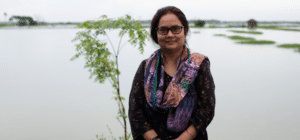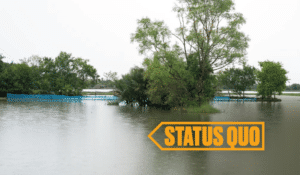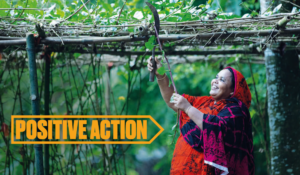It’s time for us all to choose: the status quo or positive action?
People on the front line of the climate crisis are already making positive choices and pioneering innovative solutions to adapt to new weather patterns. Bangladesh faces sea-level rise and extreme flooding due to climate change, but it’s adapting fast. We talk to Afsari Begum, our climate expert in Bangladesh, about the impact of climate change on communities there.

Asfari Begum
What has been the main impact of climate change in Bangladesh?
Floods and cyclones are not new to the people of Bangladesh, but what is different is the intensity and frequency of this extreme weather. In 2020, people saw five times more flooding than usual. Personally, I have never seen flooding this bad before. Entire cities are now waterlogged. We’re not adequately prepared for this, and many people are going through extreme hardship.

Severe flooding is becoming more frequent in Bangladesh and many other countries around the world
Who is worst affected?
It’s the poorest communities suffering most. As we all know, Bangladesh is not responsible for causing climate change – our contribution is insignificant on a global scale. And yet it is the poorest people here that are experiencing the most damaging effects.
Growing crops in the normal way is no longer possible in many places across Bangladesh because of flooding and sea-level rise. People are having to leave their rural homes to search for work in urban areas. And when they get to cities, they’re finding another set of problems. The basic services that a community needs, like waste disposal, aren’t there. The cities just can’t cope with the huge influx of people. This results in overcrowded and unsanitary living conditions for many people.
For me it’s heartbreaking that rural communities are losing their homes. They’re losing their croplands, their livestock and they’re even losing their ancestral lands. They’re losing their schools, their colleges and their cultural spaces, their local biodiversity. But it goes even deeper than this. They’re losing their friendship groups and their cultural heritage. They’re losing their identity. Some of these losses can never be replaced.
Without action, the situation will only get worse. There will be greater food insecurity because more farmland will be underwater. There will be more migration and more displacement. More people will be unable to find work and support their families. Climate change means these communities are seeing opportunities vanishing every day.
What solutions can be put in place to support these communities?
To give you one example, the weather information systems we have implemented together have given farmers more control of their situation. They are no longer at the mercy of the weather. Up-to-date weather forecasts posted on digital weatherboards in communities help farmers make better decisions about their day-to-day operations. For instance, if farmers know it’s going to rain heavily for the next five days, they’ll know that it’s not the right time to get planting.
What really excites me from this work is seeing how the government of Bangladesh has adopted Practical Action’s approach and now they’re scaling it up to reach many more people in many different areas. With the support of the World Bank, Bangladesh Department of Agricultural Extension and Bangladesh Meteorological Department, digital weather information systems have been introduced widely in the country over the last two years. This is really going to make a big difference for rural communities.
But of course there is much more to be done. And it is not just Bangladesh experiencing the impact of climate change. More solutions like this need to be developed and more communities need access to them. It will take many more organisations working together, and continuing to innovate in response to the rapidly changing climate.

More accurate weather forecasts help farmers like Amena prepare for floods and protect their crops
What inspires you with optimism for the future?
What gives me hope is seeing how the people of Bangladesh are working together in a very integrated way. I mean everyone: the communities, along with local and national government, and Practical Action of course. That’s one of the most amazing things happening in Bangladesh. Together we are really coming up with new solutions, finding a way out of suffering, and into resilience.
One thing I have realised is that the people of our country really have the capability and courage to adopt these new approaches and systems. They are really determined. They know they can cope with changing situations. They know they have the capacity to adapt. They know they can do it. I think they are the real heroes and they really inspire me.
b>Hear more from Afsari on BBC Radio 4’s Costing the Earth.